- Home
- Isaac Hooke
Mech 3
Mech 3 Read online
Mech 3
Isaac Hooke
Copyright © 2019 by Isaac Hooke
All rights reserved.
No part of this book may be reproduced in any form or by any electronic or mechanical means, including information storage and retrieval systems, without written permission from the author, except for the use of brief quotations in a book review.
www.IsaacHooke.com
For my dad, my best fan
Give 'er hell
Contents
Chapter 1
Chapter 2
Chapter 3
Chapter 4
Chapter 5
Chapter 6
Chapter 7
Chapter 8
Chapter 9
Chapter 10
Chapter 11
Chapter 12
Chapter 13
Chapter 14
Chapter 15
Chapter 16
Chapter 17
Chapter 18
Chapter 19
Chapter 20
Chapter 21
Chapter 22
Chapter 23
Chapter 24
Chapter 25
Chapter 26
Chapter 27
Chapter 28
Mech 3
About the Author
Acknowledgments
In Closing
1
With plasma bursts going off all around him, Rade leaped into the simmering pool of lava. He sank quickly, the molten magma swallowing him, and his vision went dark.
His Falcon mech was rated to withstand temperatures of up to a thousand Kelvin, though for only a few minutes. Of course, some parts would burn out sooner than others, such as his camera lenses.
“Valjean, status?” he said.
“I am reading an external temperature of close to twelve hundred Kelvin,” the Falcon’s AI said.
“A little higher than expected,” Rade said.
“Just a little,” Valjean agreed.
Rade glanced at the overhead map overlaying his HUD. The red dots representing the enemy tangoes were frozen on the map in their last known positions. “Can we tell if they followed?”
“Negative,” Valjean said. “LIDAR is worthless here, as are all forms of vision. We are completely blind.”
Rade felt a pressure on his soles as the inner actuators that cocooned him inside the cockpit relayed tactile information to the jumpsuit he wore. It told him he’d touched the bottom of the lava lake.
He inched his way forward. Before leaping into the magma, Valjean had recorded the extents of the pool, which overlaid Rade’s vision in the form of a wireframe, concave bowl. Well, the bowl was bottomless, of course, since LIDAR hadn’t been able to penetrate the lava.
The ground below him slowly filled out with polygons as he advanced and manually mapped out the bottom of the bowl.
He made his way toward the far edge, where, earlier, he had spotted a smaller trench that led underneath the rock face on the surface. The ground beneath him slowly sloped upward so that he was forced to crouch by the time he reached the trench that fed the pool, and ducked underneath the rock above it.
When he was past the rock face, he stood up, and his head and shoulders emerged from the lava. He knew because of the sloughing sensation imparted by the tactile sensors to his own head and shoulders. But he still couldn’t see.
“We’ve partially emerged from the lava,” Valjean said. “Cameras are offline. LIDAR is still functional. Activating.”
Around Rade, the inside of a cave filled out. There was a ledge beside him, and he pulled himself onto it, lifting his mech out of the deadly magma.
“How’s our surface temperature?” Rade asked.
“Plunging,” Valjean replied. “Though the air temperature here is still close to the thousand-degree mark.”
“As the lava hardens, will it affect mobility?” Rade pressed.
“No,” Valjean said. “The rock will remain soft and malleable for quite some time, given the air temperature. As long as we keep moving, it will break away.”
“Good.” He continued forward into the rock cave, uncertain what he would find.
This entire mission was an uncertainty. He had become separated from Tahoe, Bender, and Pyro shortly after landing on the colony—they had been discovered by hunter killers, and forced to scatter. The drones had identified Rade as the leader, and concentrated their attacks on him. He used that opportunity to lead the hunter killers away from his men.
And here he was.
This world was owned by the Sino Koreans. His team was here to confirm reports that the Sino Koreans were bioengineering a new type of weapon based on Terran and alien DNA. The SKs had recovered the latter material from the colony worlds formerly attacked by those aliens known as the Draactals. Combining human DNA, or DNA from any other inhabitants of Earth, with alien DNA was strictly forbidden by treaty. While it was true the Sino Koreans had capitulated to the United Systems in the last war, the government—along with most of the populace—resented the heavy reparations that had been imposed on them by the victors. It wasn’t surprising they were looking for ways to gain the upper hand against the United Systems again, by whatever means necessary. Performing the research on a faraway colony world allowed the Sino Koreans plausible deniability, since most of their colonies still operated at least somewhat independently, and the blame could be placed on the regional governors, not the Paramount Leader.
Rade continued into the cave. This mountain was rumored to contain the research facility he sought. The Sino Koreans were thought to be using the geothermal energy produced by the active volcano to power their work. It wouldn’t surprise him if all of the intel was wrong, however, and nothing existed inside this mountain but rock and magma. Then again, why the aggressiveness of the hunter killer attack?
The overhead map continued to fill out as Rade advanced, along with the cave walls around him, displayed in their usual wireframe representation.
An opening appeared ahead. Rade paused.
“Shut down LIDAR bursts,” he said. “Let’s not give away our position to any guards waiting on the other side.”
“Shutting down LIDAR,” Valjean said.
“Is it safe to open the cockpit?” Rade asked.
“Your jumpsuit will protect you from the toxic environment,” Valjean replied.
“Yes, but I meant, will any of the lava on the hull drip down onto me when I step out?” Rade pressed. “And will it burn my gloves when I clamber down the rungs of your leg?”
“No,” Valjean said. “It has mostly sloughed off. The remaining portions have cooled and hardened to the point that they will not harm you if pieces crumble away and land on your suit.”
“All I wanted to know,” Rade said. “Open up the hatch.”
The inner actuators that hugged him fell away, and he dropped the short distance to the bottom of the cockpit as the hatch fell open.
He stared into the darkness before him. The cave extents remained visible as wireframes that overlaid his vision. Ahead of him, where the opening resided, dim light shone from beyond.
He activated his headlamp and directed his gaze at the tunnel floor. It was made of solid rock.
Rade lowered the intensity of his lamp and stepped out from underneath the upper edge of the cockpit; he leaped off the hatch, not really wanting to test out whether his suit would withstand contact with the dried magma that flaked the rungs.
He released a quick burst of counter thrust from his jetpack before hitting the cave floor so that he landed softly.
“Stay here,” Rade said.
Valjean’s environmental blending skin would have been burned away from the lava, whereas the camouflage tech built into Rade’s jumpsuit still functioned perfectly. Plus, the mech was noisy.
He remotely activated the storage compartment in Valjean’s leg, and the mech retrieved the plasma rifle inside for him.
Rade accepted the weapon, and edged forward on his own. He reduced the intensity of his suit’s comm node, and pointed the directional antenna backward, to Valjean, so no one in front of him would read his signal. He kept his headlamp active at first, but as he got closer, he deactivated it entirely so as not to give away his position.
A few meters from the glowing entrance, he dropped to a low crawl and wormed his way forward.
At the verge, he peered past, and saw a vast cavern illuminated by several floodlights placed at strategic locations throughout. Several Sino Korean mechs and combat robots patrolled the open areas, while technicians wearing white environmental suits moved to and fro, sometimes carrying bulky containers or directing robots pushing pallets.
At the center of all of this was something Rade hadn’t been expecting.
A half-buried starship.
At least, he assumed it was a starship. It looked like a huge, saucer-shaped metal object protruding from the rock. It was slightly indented toward the middle region, like a donut, before that portion was swallowed by the rock. Either it had crashed into lava, probably hundreds or thousands of years ago, or the force of its impact had turned the surrounding rock to magma, which in turn had solidified, encasing the vessel in its stone tomb.
Some of the white-suited techs moved along the surface of the alien starship, running disc-shaped metal scanners across the surface. Other techs knelt and pressed devices into the metal—they looked like irons connected by accordion-like tubes to base stations. Still others took samples with laser cutters.
A long, can-shaped passageway, like the kind often used on lunar bases to connect the dome modules, was connected to the ship near the center. Men came and went from the far side of that passageway, some dressed in the white environmental suits, others in darker military jumpsuits. Likely that passageway was connected to wherever the SKs had drilled inside.
Well, the intel was wrong yet again. The Sino Koreans weren’t bioengineering human and alien hybrids; instead, they’d discovered the vessel of an entirely new alien race. At least, Rade assumed it was a new alien race, given that the ship was of a design he had never seen. And the Sino Koreans were trying to harvest its technology.
“The United Systems is going to want in on this,” Rade sent Valjean.
“Likely,” Valjean agreed. “Is it time to withdraw?”
“Yes,” Rade said. “We’ve done enough here.”
Rade started to edge his way backward when a net wrapped around his upper body, ensnaring him. The Sino Korean equivalent of an HS3 dropped from the ceiling overhead, where its environmental blending skin had allowed it to escape his notice. Several more combat robots appeared around him, deactivating their own environment blending. They all had their laser rifles pointed at him.
Rade raised his hands as well as he was able beneath the confines of that net.
“They got me,” Rade sent. “Get out of here.”
Two of the combat robots leaped over him and raced into the cave. Rade heard the sound of plasma rifles firing, along with the clang of heavy footfalls as his mech retreated.
The combat robots forcefully hauled Rade to his feet and disarmed him. They also took away the suitrep kit he carried in the cargo pocket of his leg assembly. They shoved him forward, toward a group of waiting mechs. Two bipedal mechs rushed past him and into the tunnel to help the combat robots hunt Valjean.
Still, Rade knew his Falcon would get away. He had a good head start on the bipedals, and the two combat robots certainly wouldn’t catch him, not before he reached the lava stream and dove inside.
Valjean fell out of comm range shortly, his blue indicator freezing on the overhead map, along with the red dots that marked his pursuers in the tunnel.
The SK combat robots loaded him into the passenger seat of one of the humanoid mechs, and secured him with carbon fiber binds, then sprayed his faceplate and camera with a black substance, blocking his vision. They also gummed up his LIDAR device, because when he tried to activate it, he got nothing.
He felt motion, indicating the mech was underway. He struggled against his binds, but even with the strength enhancement his suit provided, he was unable to break free.
Rade was thus blind and helpless as he was carried away into the clutches of the Sino Koreans.
Well, I’ve been in worse situations, he told himself.
But, at the moment, that was kind of hard to believe.
2
Rade was forcibly pulled from the passenger seat a short while later. Strong arms pinned him down, and removed the jumpsuit, ripping away sections so that it would be impossible to wear again. Though the suit lost pressurization, air didn’t rush in or out, and he didn’t choke. A good sign.
Sort of. Because it only meant he would live long enough to endure interrogation at the hands of the Sino Koreans. Their questioning techniques weren’t known to be gentle. He’d been captured by Sino Koreans a few times before, most recently in the very palace of their paramount Leader, but that last time he had escaped before the interrogations could begin. He doubted he would be so lucky this time.
In moments, he was left wearing only his cooling and ventilation undergarments. Four combat robots held him down. He struggled against them as the telescoping limbs of a medical robot peeled away the undergarment that covered his bicep. One of those limbs employed a surgical laser, cutting open the skin, while a second limb held open the thin slit that resulted; a third slid a small, rectangular microchip between the skin and the muscle. When that was done, the second limb released him, and the laser fired again, sealing and cauterizing the wound.
The limbs of the medical robot retracted, and it wheeled from the cell.
The four combat robots let him go and departed. He stood immediately, and stars filled his vision; he blinked them away and rushed the doorway. A steel door slammed into place before he reached it, trapping him in the cell.
He paused to survey his surroundings. His head brushed the low ceiling, and he could almost touch all four walls around him when he spun in a circle with his hands extended. The surfaces were smooth, made of plaster painted a light blue color, though the floor was concrete. There was no bed, or any other furniture. A small drain in the floor served as his toilet. There were dark stains around it.
Rade felt his bicep region. The area where they chipped him was painful to the touch. He considered ripping out the device, which wouldn’t be hard, considering it was embedded just beneath the skin. Painful, but not hard. Still, he knew there was no real point. They would simply embed another. Besides, it might have been designed to deliver a toxin if he attempted to remove it.
He boosted the communications range of his Implant to the maximum, but received no pings from the other members of his team. If they were captured, either they were located well away from him, or the walls blocked the signals.
He checked his remote interface. There were a few nodes that registered, with Korean-Chinese characters for names, but he didn’t have the permissions necessary to access any of them.
He emptied his bladder into the drain in the floor, and then sat back against the wall, his feet stretched across the concrete beneath him. The fabric of the undergarment that covered his legs snagged in places against the floor, like a microfiber cloth would, making it difficult to achieve a comfortable position. Finally, he found a spot, and then leaned his head back against the wall.
Flashing lights appeared in the ceiling overhead, and loud music assaulted his ears. Rade smiled grimly. His Implant had protections installed for these very scenarios, and he activated them. The music instantly cut out, replaced with absolute silence. He shut his eyes, blocking out the light. He could still see the bright flashes through the skin of his eyelids, but a moment later those, too, became almost imperceptible, as his Implant numbed the light receptivity of the neurons responsible
for detecting light from the rod cells of his retinas.
There were a few virtual reality programs he could also run at the moment, but he knew that in his current state of mind he would be too distracted to execute them. It was better to simply lay here and concentrate on keeping his mind clear.
He stayed like that for two hours, according to the clock in the lower right of his vision. He had become accustomed to the slight burst that appeared on the inside of his eyelids from those subdued flashes so that when they stopped, he noticed immediately. He opened his eyes to find the door opening in front of him.
He restored his light receptivity and sense of sound. The loud music had stopped, but his hearing seemed muffled, similar to how it felt after attending a live concert, or a particularly loud movie screening: though his Implant had shielded his mind from the sound, his eardrums had still been exposed to it.
A man dressed in a military uniform entered, accompanied by one of the combat robots. Rade remained seated. He wasn’t sure, but he suspected the man was an Artificial, someone who looked completely human, but was actually a machine. The Sino Koreans wouldn’t have sent in an ordinary man to interrogate him: this was a Keeper, no doubt, the feared interrogators the Sino Koreans used to extract confessions from prisoners. Rade noticed the pair of black gloves hanging ominously from the man’s belt.
The robot closed the door behind the man.
“You are Rade Galaal?” the man said in perfect English. That only confirmed he was an Artificial. Sino Koreans rarely bothered to learn English these days, not when Implants or aReals could translate their words in realtime.

 Warden 2
Warden 2 Devastator
Devastator Warden 4
Warden 4 Emperor
Emperor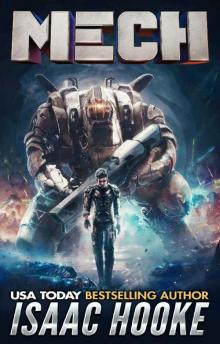 Mech
Mech Conqueror
Conqueror Fighter
Fighter The Forever Gate Ultimate Edition
The Forever Gate Ultimate Edition Defiler
Defiler Mech 2
Mech 2 Warden 3
Warden 3 Warden 1
Warden 1 Mech 3
Mech 3 Forerunner
Forerunner The Alliance (AI Empire Book 2)
The Alliance (AI Empire Book 2) Breaker (Monster Tamer Book 1)
Breaker (Monster Tamer Book 1) Bender of Worlds
Bender of Worlds The Pendulum Swings (The Forever Gate Book 8)
The Pendulum Swings (The Forever Gate Book 8) The Link
The Link Just Another Day
Just Another Day Star Warrior
Star Warrior Alien War Trilogy 1: Hoplite
Alien War Trilogy 1: Hoplite Battle Harem 3
Battle Harem 3 The Ethan Galaal Series: Books 1 - 3
The Ethan Galaal Series: Books 1 - 3 Reloaded
Reloaded Robot Dust Bunnies (Argonauts Book 5)
Robot Dust Bunnies (Argonauts Book 5) Battle Harem
Battle Harem ATLAS 3 (ATLAS Series Book 3)
ATLAS 3 (ATLAS Series Book 3) Argonauts 2: You Are Prey
Argonauts 2: You Are Prey Worlds at War (A Captain's Crucible Book 5)
Worlds at War (A Captain's Crucible Book 5) Operation: Bug Spray (Argonauts Book 9)
Operation: Bug Spray (Argonauts Book 9) Battle Harem 2
Battle Harem 2 Redeemed (Bolt Eaters Trilogy Book 3)
Redeemed (Bolt Eaters Trilogy Book 3)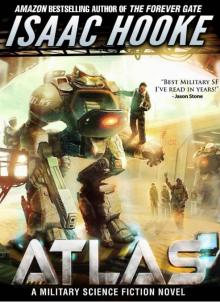 Atlas
Atlas Argonauts 1: Bug Hunt
Argonauts 1: Bug Hunt Reactivated (Bolt Eaters Trilogy Book 1)
Reactivated (Bolt Eaters Trilogy Book 1) Alien War Trilogy 3: Titan
Alien War Trilogy 3: Titan Flagship (A Captain's Crucible #1)
Flagship (A Captain's Crucible #1)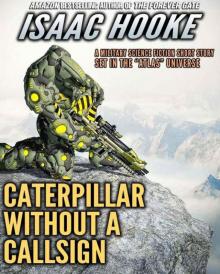 Caterpillar Without A Callsign
Caterpillar Without A Callsign The Forever Gate
The Forever Gate He Who Crosses Death (Star Warrior Quadrilogy Book 3)
He Who Crosses Death (Star Warrior Quadrilogy Book 3) Reforged (Bolt Eaters Trilogy Book 2)
Reforged (Bolt Eaters Trilogy Book 2) Refurbished
Refurbished Reloaded (AI Reborn Trilogy Book 2)
Reloaded (AI Reborn Trilogy Book 2) He Who Crosses Death
He Who Crosses Death Explorations: First Contact
Explorations: First Contact Planet Killer (A Captain's Crucible Book 4)
Planet Killer (A Captain's Crucible Book 4) Quantum Predation (Argonauts Book 4)
Quantum Predation (Argonauts Book 4) Clandestine-IsaacHooke-FreeFollowup
Clandestine-IsaacHooke-FreeFollowup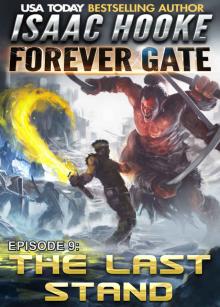 The Last Stand (The Forever Gate Book 9)
The Last Stand (The Forever Gate Book 9) City of Phants (Argonauts Book 6)
City of Phants (Argonauts Book 6) Test of Mettle (A Captain's Crucible Book 2)
Test of Mettle (A Captain's Crucible Book 2) Cradle of War (A Captain's Crucible Book 3)
Cradle of War (A Captain's Crucible Book 3) Rade's Fury (Argonauts Book 7)
Rade's Fury (Argonauts Book 7) Rebirth (The Forever Gate Book 6)
Rebirth (The Forever Gate Book 6) The Forever Gate Compendium Edition
The Forever Gate Compendium Edition Mechs vs. Dinosaurs (Argonauts Book 8)
Mechs vs. Dinosaurs (Argonauts Book 8) Alien War Trilogy 2: Zeus
Alien War Trilogy 2: Zeus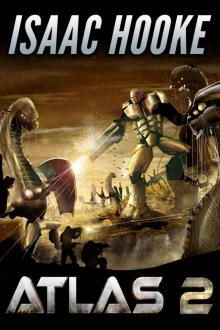 ATLAS 2 (ATLAS Series Book 2)
ATLAS 2 (ATLAS Series Book 2) Operation_Bug Spray
Operation_Bug Spray